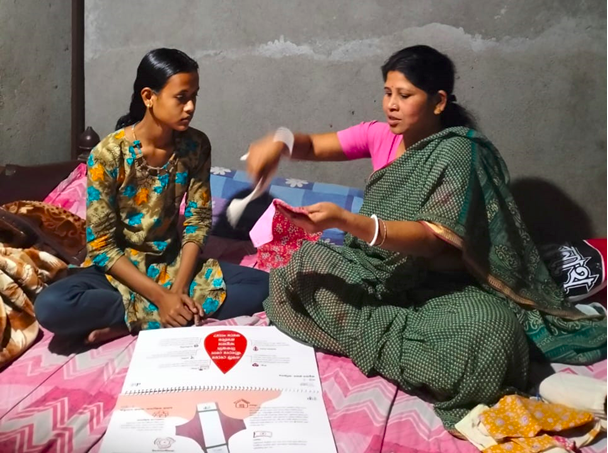The Digital Didi program has been very actively engaged in encouraging women to take up sustainable practices towards maintaining better menstrual health. It also provides basic digital knowledge to be able to implement these changes on a much larger scale.

Change can happen only when it starts from one individual who has an open minded approach towards social issues. When the vast majority within the community think in a certain way and one understands that there is a different way of looking and practising certain things, it also demands a lot of courage to be able to embrace something new and step out to advocate it.
Moushumi Haldar, a woman from a village in Nadia District of West Bengal, working as Digital Didi says she has always been curious about the feasibility of menstrual pads in today’s fashion conscious and consumer-centric society. When she first heard about the Digital Didi program, she had a lot of questions and doubts. But after receiving training from the organisation, Moushumi’s perspective changed, and she realised the significance of promoting best menstrual practices and sustainable menstrual products.

The training provided by the organisation helped Moushumi understand the need to break the silence around menstrual health and start open conversations about it. She was hesitant at first, but soon realised that talking about menstrual health was necessary to dispel the myths and taboos surrounding it. She recognized the importance of addressing this issue and felt that this work should have started much earlier.
Moushumi was excited to become part of the Digital Didi program, which not only provided her with a new source of income but also gave her the opportunity to promote menstrual health and sustainability in her community. She started the awareness drive in her village by explaining to women in her village the harmful effects of traditional menstrual products on health and the environment and encouraged them to shift from commercial sanitary pads to smart pads, which are cloth-made and eco-friendly.
With her consistent efforts in the community, Moushumi has mobilised 20 women to purchase SmartPads. It earned her a profit of 1,000 rupees. She is now motivated to reach out to more women and girls to promote the usage of sustainable menstrual products. She believes that if she can acquire 100 customers, she can earn an income of two to three thousand rupees comfortably from her home.

Through the Digital Didi program, Moushumi is initiating a positive change in behaviour and breaking taboos surrounding menstruation. By promoting sustainable menstrual practices, she is not only improving her own health but also contributing to a better future of her community. The Digital Didi program has provided a platform for women like Moushumi to create social and economic opportunities for themselves and others in the community. With more women joining the program, there is a great potential to bring about long-lasting social and economic benefits to create a brighter tomorrow for all.








